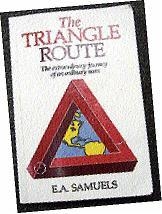
The book, The Triangle Route, has nothing to do with the 'Triangular Slave Trade'. As the subtitle states, it is 'the extraordinary life of an ordinary man', E.A. Samuels, who "travelled extensively between the Caribbean, the United Kingdom and the United States of America" during the first 27 years of his life.
Errol A. Samuels, whose parents originated from St Elizabeth, was born out of wedlock at Victoria Jubilee Hospital in 1948. He remembers living in a tenement yard at bustling Oxford Street in west Kingston in his early years, after which his family moved to live with his maternal grandmother in another tenement settlement at 9 Hampton St in the Campbell Town section of Allman Town, central Kingston.
One of his most vivid recollections from that time was visiting an elderly female relative called Dudu, who had a coffin under her bed. Every time he went to see her he would take a peek at 'the strange box'. Dudu, it would appear, had been making preparations for her transition to another place.
Hurricane Charlie
He also remembers the aftermath of hurricane Charlie in 1951, but he has no memory of the actual storm, since he had slept through it.
His parents next moved to 10A Hampton Street. And that's where they got married. The excitement surrounding the marriage was only topped by that caused by the coronation of Queen Elizabeth II, and the visit to Jamaica of Britain's wartime prime minister, Sir Winston Churchill. He remembers "being taken to Marescaux Road, near the reservoir on a crowded sidewalk, to get a glimpse of the great man driving past in a convoy".
Living in the tenement yard itself, especially one occupied by eight families, had its fair share of drama and tension. The yard was a place where good friends and neighbours "malice" and then "chat back" to each other. Most times the all-important standpipe was the basis of the arguments. Many a young girl honed her "tracing" skills at the standpipe in that "dense living environment".
"Every female tenement yard resident knew how to curse and swear ... verbal insults, name-calling and the liberal use of cuss-words were the weapons of choice."
However, the tenement yard women could also cook very well. On kerosene and coal stoves, placed outside, near their rooms, they cooked delicious dishes of curried mutton, fish tea, pork, stewed beef, tripe, rice and peas, cow cod soup, cornmeal porridge and beef soup. On Sundays, there were pots of food cooking simultaneously from in the morning.
"Some single tenant ladies entertained their visiting gentlemen friends on Sunday, and a big dinner, served early, was sure to enlarge their weekly allowances."
At age five, Errol started to attend infant school. His father, who worked at Lascelles de Mercado, and with whom he had an excellent relationship, would take him to school on the crossbar of his bicycle. It was at that time he began to appreciate American music played by Radio Jamaica Rediffusion, the only station on the island at the time.
"I have clear memories of those songs being played at sunset as I stood by the gate, looking out for my father to come home ... When I saw him turn the corner I would be filled with joy," he writes.
Another thing that would give him unspeakable joy was spending time with Mama Lue, his paternal grandmother. She was a Maroon woman who farmed her land in Elderslie, St Elizabeth, and sold her produce at Maggotty every Saturday. Each month, Mama Lue sent a basket of food, with a letter and sometimes money in an envelope to Errol's father. Among the food there was either a delightful cornmeal or potato pudding, and occasionally a 'dukunnu'. Also, "she always sent a slab of roast beef that was eaten off as soon as it came. It was that delicious".
Errol and his parents visited Mama Lue at least twice a year. By train they would travel to Maggotty. It was a day-long journey inclusive of long stops along the way. Errol loved the exciting train rides but was taken aback the first time he went to use the train's toilet.
"There was no collection tank on the train toilets, so all the waste matter fell on to the tracks, eventually dried up by the hot tropical sun."
Country life was different from Kingston's tenement living. He spent his visits bathing in the river, eating fruits, riding donkeys and going to the bush to plant and reap food. But it was the food cooked in the bush that was the highpoint of his "holidays".
"Nothing in the world tastes better than a dumpling dipped in mackerel gravy on a banana leaf and stuffed into the mouth with one's hand ... it is Heaven on Earth ... " After the heavenly gastronomic euphoria, it was back to the drudgery of life in Kingston.
Apparently tired of tenement yard life, Errol's father moved the family to Sackville Road, in Vineyard Town, which had a higher social status than Allman Town. There were three families in their yard, including a well-to-do woman who had a precocious son named Ronnie. Errol became part of Ronnie's "gang". And life was good, though he had to walk to school in Allman Town and back.
Adventurous

Being an adventurous child himself, in the evenings Errol would go to Kingston Harbour to watch the ships and the youths diving into the water to retrieve coins thrown by sailors. He got to know Kingston's "popular" street people, including the fat Chinese man, the couple Ma-Mud and Pa-Clay and "Bag-a-wire". There was also the soldering man who went around patching the holes in people's enamel utensils.
It was a regular thing for his parents to go to work in the United States (US) for short periods. Suddenly, when he was about six years old, his father migrated to England. Soon after, his mother went back to work in the US. Errol and his grandmother then moved to Montague Street, in Rollington Town, a lower-middle-class community.
The landlady had two dogs that were fed bulla, among others things. In those days, there was a certain stigma attached to eating bullas yet it was eaten with avocado pear in the privacy of people's homes. The landlady used to ask Errol to buy bullas at the corner shop, but Errol's grandmother was not pleased. She didn't want people to get the idea that Errol was buying them for their home. "She politely asked the landlady to cease and desist" from sending Errol to buy bullas.
His mother returned from New York with news that she and Errol would be joining his father in England. He was given Scott's Emulsion to strengthen him to face the harsh English weather. Preparation for departure thus went into full swing.
"The first stage in my young life was about to end. The stage was set for the first leg of the triangular route to commence, the segment joining the island of Jamaica to the mighty neighbour of the north, the United States of America," E.A. Samuels writes.
paul.williams@gleanerjm.com